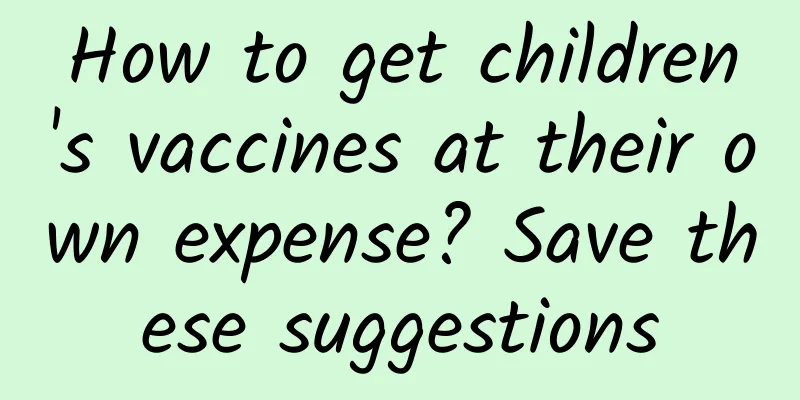How to get children's vaccines at their own expense? Save these suggestions

|
Author: Fang Xiao, The First Affiliated Hospital of Zhengzhou University Reviewer: Wang Huaili, Chief Physician, The First Affiliated Hospital of Zhengzhou University Babies under 3 years old need to get many kinds of vaccines. In addition to the vaccines in the national immunization program, there are also some vaccines that are paid for by the parents, namely the second-class vaccines. Many parents have questions: Do these vaccines that are not yet included in the national immunization program need to be given? How can we give children comprehensive protection, reduce the number of injections and save money? Figure 1 Copyright image, no permission to reprint 1. Varicella vaccine The varicella vaccine is used to prevent varicella. Varicella is transmitted through the respiratory tract and is highly contagious, which may lead to serious complications. Moreover, after the varicella is cured, the virus will still lurk in the body and will come out to cause trouble when the human body's immunity is low. It can also cause herpes zoster in adults, commonly known as "snake around the waist". Therefore, it is very necessary to vaccinate against the varicella virus. Vaccination recommendations : The first dose of this vaccine is usually given at 12 to 15 months of age, and a booster dose is given at 4 years of age. 2. Flu vaccine In recent years, influenza has been rampant, even causing school classes in many areas to be suspended. Getting a flu vaccine can effectively reduce the risk of infection and serious complications. The influenza virus mutates very quickly, so the country "upgrades" the flu vaccine every year. Vaccination recommendations : It is recommended that children over 6 months old receive the latest flu vaccine of the year from September to November each year. Children aged 3 to 18 can also choose nasal spray flu vaccine. However, nasal spray vaccine is a live vaccine and is not suitable for people with impaired immune systems, asthma patients, etc. There is currently no flu vaccine suitable for babies under 6 months old. By vaccinating family members who take care of the baby with flu vaccine, a family protection circle can be established to indirectly protect the baby. 3. Pneumococcal vaccine Pneumococcal vaccines can prevent a variety of diseases caused by pneumococcal infection, such as pneumonia, otitis media, meningitis, sinusitis, etc., including what we commonly call 13-valent pneumococcal vaccine (13-valent pneumococcal polysaccharide conjugate vaccine) and 23-valent pneumococcal vaccine (23-valent pneumococcal polysaccharide vaccine). Vaccination recommendations : The 23-valent pneumococcal vaccine can provide more comprehensive protection, and one dose can provide a relatively long-lasting immune effect, but it cannot be used for children under 2 years old. Children under 2 years old can be vaccinated with the 13-valent pneumococcal vaccine, which usually requires 4 doses, which are administered at 2 months, 4 months, 6 months, and 12 to 15 months. Infants and young children are prone to develop severe illness after being infected with pneumococci, so it is highly recommended that children under 2 years old be vaccinated with the 13-valent pneumococcal vaccine. The 23-valent vaccine covers 10 more pneumococcal serotypes than the 13-valent vaccine, so infants and young children who have been vaccinated with the 13-valent pneumococcal vaccine can receive another shot of the 23-valent pneumococcal vaccine after the age of 2 to obtain more comprehensive protection. 4. Oral rotavirus vaccine Rotavirus infection can cause rotavirus enteritis, also known as autumn diarrhea. The disease is transmitted through the fecal-oral route, mainly among infants and young children, and can cause symptoms such as diarrhea, vomiting, and fever. Currently, there is no specific drug for hand, foot and mouth disease, so vaccination is recommended for infants of appropriate age. Vaccination recommendations : There are two oral rotavirus vaccines on the market: Rotarix and RotaTeq. RotaTeq has a better preventive effect, but is relatively expensive and requires more doses. Overall, both vaccines can effectively prevent rotavirus enteritis. Parents can choose according to the types of vaccines provided in their area and their budget. 5. EV71 vaccine Commonly known as hand, foot and mouth vaccine, it is used to prevent hand, foot and mouth disease caused by enterovirus 71 (EV71). It is worth noting that in addition to EV71, other enteroviruses such as A16 and Coxsackie virus can also cause hand, foot and mouth disease, but compared with other viruses, hand, foot and mouth disease caused by EV71 is more likely to develop into severe illness and even cause death. Vaccination recommendations : The vaccination targets are mainly children aged 6 months to 5 years, and generally require 2 injections. It should be noted that it is still possible to contract hand, foot and mouth disease after vaccination with EV71 vaccine, but it can greatly reduce the incidence of severe hand, foot and mouth disease. Therefore, vaccination with EV71 vaccine is very valuable. 6. Pentavalent vaccine (DPT, IPV, Hib), Haemophilus influenzae type B vaccine (HIB) The pentavalent vaccine is used to prevent diseases including whooping cough, tetanus, diphtheria, polio and Haemophilus influenzae type b. Vaccination recommendations : Usually 4 injections are required, namely at 2 months, 4 months and 6 months after birth, and a booster dose at 12 to 15 months. If you get the pentavalent vaccine, you don't need to get the diphtheria, pertussis and tetanus vaccine (free), diphtheria, pertussis and tetanus vaccine (free), polio vaccine (abbreviated as polio vaccine) (free and self-paid vaccines), Haemophilus influenzae type B vaccine (self-paid), and diphtheria, pertussis and tetanus Hib combined vaccine (self-paid). The figure below summarizes the characteristics of different vaccination strategies, and you can choose according to your own situation. Figure 2 Copyright image, no permission to reprint 7. Meningococcal Vaccine Meningococcal vaccines are used to prevent epidemic cerebrospinal meningitis, sepsis and other diseases caused by infection with Neisseria meningitidis (also known as meningococcus). There are two types of meningococcal vaccines: polysaccharide vaccines and polysaccharide conjugate vaccines. Polysaccharide vaccines have the advantages of relatively low price and good immune effect, but they are not suitable for infants under 2 years old. There are three types of polysaccharide vaccines, namely group A meningococcal polysaccharide vaccine (free), group A and group C meningococcal polysaccharide vaccine (free), and group ACYW135 meningococcal polysaccharide vaccine (at your own expense). There are two types of polysaccharide conjugate vaccines, namely group A and group C meningococcal conjugate vaccine (at your own expense) and group ACYW135 meningococcal polysaccharide conjugate vaccine (at your own expense). Vaccination recommendations : Children under 2 years old should be vaccinated with polysaccharide conjugate vaccine, and children over 2 years old should choose polysaccharide vaccine. Vaccines covering the ACYW135 group have more comprehensive protection and are therefore recommended. 8. Inactivated Japanese encephalitis vaccine The inactivated Japanese encephalitis vaccine is used to prevent Japanese encephalitis caused by the Japanese encephalitis virus. The Japanese encephalitis virus is transmitted through mosquito bites, so Japanese encephalitis is a serious insect-borne infectious disease. The live attenuated Japanese encephalitis vaccine is a free vaccine in the national immunization program and can provide good preventive effects for children. Vaccination recommendations : Immunodeficient patients can only be vaccinated with inactivated Japanese encephalitis vaccine. 9. Hepatitis A inactivated vaccine Hepatitis A is an infectious disease transmitted through fecal-oral route. The live attenuated hepatitis A vaccine is a free vaccine under the national immunization program. It has a good immune effect, but the probability of adverse reactions after vaccination is relatively high, mainly manifested as fever, rash, etc., but most of them are transient and not serious, and one shot is enough. Vaccination recommendations : The immune effect of the self-paid inactivated vaccine is slightly inferior to that of the attenuated live vaccine. Usually two injections are required, and the adverse reactions are relatively small. Immunodeficiency patients can only be vaccinated with inactivated vaccines. 10. Oral Cholera Vaccine Oral cholera vaccine is an oral vaccine against the cholera virus. In recent years, there have been few reports of cholera cases in my country, so this vaccine is not generally administered routinely. Vaccination recommendations : According to the World Health Organization's assessment, the current global cholera risk is at a very high level. If you plan to travel to countries and regions where cholera occurs, it is recommended to get vaccinated in advance. Figure 3 Copyright image, no permission to reprint Vaccines are the "shield" that protects children from diseases. After reading this article, do you know more about which vaccines to give your children? Find your child's green booklet and upgrade and improve your child's "shield"! |
<<: How to treat loss of appetite after chemotherapy?
Recommend
How many days do I need to rest after taking abortion pills?
When a man and a woman love each other to a certa...
What to do if you have breast lumps during lactation?
Nowadays, many mothers will have this problem aft...
How long does it take to fly during pregnancy?
Pregnancy is a very difficult thing, but work is ...
International Lung Cancer Day丨The only way to prevent lung cancer is to quit smoking? In fact, cooking fumes are just as dangerous!
Lung cancer is one of the malignant tumors with t...
My breasts are too big.
Breasts are important organs of women. Women with...
What should I do if my lower back hurts after sitting for a long time?
This is the 5319th article of Da Yi Xiao Hu As th...
How many months into pregnancy can you tell if the fetal position is correct?
Because malposition of the fetus may bring diffic...
Can breast milk drops in the eyes reduce inflammation?
Many people know that breast milk is the best foo...
Why didn't my period come this month?
Whether the menstrual period is normal and health...
What kind of people are more likely to get cervical cancer? Is cervical cancer hereditary?
Cervical cancer is the fourth most common maligna...
When can I start exercising after giving birth?
Exercise is something that everyone of us has to ...
World Alzheimer's Day | Don't let the elderly with Alzheimer's forget that the world has lost their home! Active treatment and comprehensive care, neither can be lost!
Alzheimer's disease, commonly known as senile...
After watching a movie, the couple got a rash all over their body! Many people have been affected recently
This summer's movies are as hot as the weathe...
Several physical treatment methods for cervical erosion
Cervical erosion is a common gynecological diseas...
Recipes for postpartum milk production
Women will observe confinement after giving birth...









